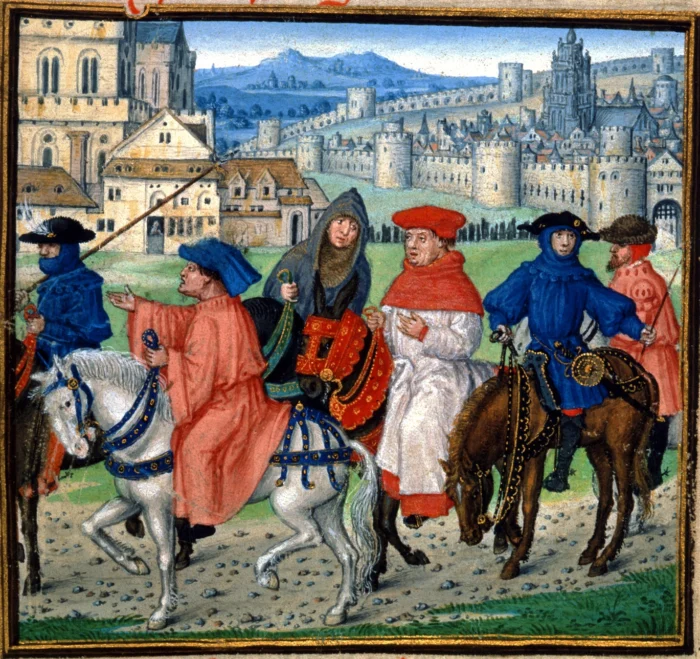המאמר הראשון בפרויקט Sivi קוראת צ’וסר
Please scroll down for an English review.
צ’וסר לא פתח את סיפורי קנטרברי עם קדושה, אלא עם גשמי אפריל.
כי לפני אמונה, יש קרקע. לפני מוסר, אנשים.
שלושים צליינים יוצאים לדרך, וכל אחד מהם מנסה לספר אמת
בזמן שהעולם הישן של אנגליה מתחיל להישבר.
ככה מתחילים מסע, וככה מתחילה ספרות מודרנית.
אביב. גשמים מתוקים רווים את השורשים, והאדמה מתעוררת לחיים.
כך נפתח הפרולוג הכללי של ג’פרי צ’וסר, אחת הפתיחות המפורסמות ביותר בתולדות הספרות האנגלית:
Whan that Aprille with his shoures soote
The droghte of March hath perced to the roote…
ובתרגומו של שמעון זנדבנק:
משפלחו גשמי אפריל רכים
את חרב מרס עד לב מעמקים
וכל עורקי עפר רחצו בלשד
שמכוחו כל ציץ שדה ילד;
זה איננו רק תיאור טבע. זו הצהרה ספרותית, כמעט תיאולוגית.
צ’וסר פותח את היצירה ברגע של פריחה כדי לדבר על התשוקה האנושית להתחדשות, על היצר האנושי לצאת לדרך, לנוע, לספר.
עם הגשם הראשון באה גם התנועה הראשונה, ואת התנועה הזו הוא הופך למטאפורה של חברה שלמה:
אצילים ואיכרים, אנשי כנסייה, סוחרים, טוחנים, סטודנטים, נשים, נזירים ונזירות.
כולם יוצאים לדרך אחת: למסע לקנטרברי.
המסע אל תומאס בקט או המסע אל עצמם
הסיפור הגלוי הוא על עלייה לרגל: עולי רגל בדרכם אל קברו של תומאס בקט, הארכיבישוף הקדוש מקנטרברי.
אבל זה רק הרקע.
צ’וסר משתמש בצליינות כתירוץ ספרותי, דרך לאסוף יחד את אנגליה של תקופתו, עם כל ניגודיה, תאוותיה וחוסר הצניעות שבה.
צליינות, כמו אמונה, אמורה לאחד.
אבל אצל צ’וסר, המסע חושף דווקא את הפערים:
דתיים מושחתים, אבירים מתהדרים, עניים פיקחים, נשים חכמות מגברים שמזלזלים בהן.
זו אינה דרך גיאוגרפית, זהו מסע של חברה שמביטה בעצמה במראה.
הפונדק כמיקרוקוסמוס של אנגליה
הפונדקאי, הארי ביילי, הוא אולי הדמות החשובה ביותר שאינה “חשובה”.
הוא העם; הקול הצוחק, הישיר, שמתווך בין כל הקולות האחרים.
הוא זה שמציע את “משחק הסיפורים” בדרך: כל צליין יספר סיפור, והזוכה יזכה בארוחה חינם על חשבון כולם.
רעיון פשוט, כמעט שובב, אבל מהפכני.
הפונדק הופך לזירת דיון על אמונה, מוסר, מעמד ומגדר.
הכנסייה איבדה את הסמכות להגדיר אמת, והעם תובע בחזרה את זכות הדיבור.
במקום דרשה, סיפור. במקום וידוי, בדיחה.
דרכו נולדת המסגרת העלילתית של היצירה: סיפור בתוך סיפור, שבו כל קול מבקש להישמע.
צ’וסר, מהפכן עם עט
צריך לזכור באיזו תקופה נכתבו סיפורי קנטרברי: סוף המאה ה־14, תחת שלטונו של ריצ’רד השני.
זו אנגליה שלאחר המוות השחור, אחרי מרד האיכרים, חברה שבה המעמדות מתערערים והאמונה הישנה מאבדת את תוקפה.
וצ’וסר הוא הראשון שנותן לזה שפה, באנגלית עצמה. לפניו, הספרות הרצינית נכתבה בלטינית או בצרפתית.
הוא זה שהפך את האנגלית העממית לשפת תרבות.
זו לא רק בחירה לשונית, זו בחירה פוליטית. להשמיע את קולו של העם בשפת העם.
מכאן ואילך, האנגלית איננה עוד לשון פשוטי העם בלבד, אלא לשון הרוח.
האביב של צ’וסר והאביב של אנגליה
כשצ’וסר כותב על גשם, הוא כותב בעצם על חברה שמבקשת גאולה.
הגשמים “שחדרו עד השורש” הם גם רמז לניקוי חטאים; אך לא חטאים תיאולוגיים, אלא חטאי סדר חברתי מתפורר.
כך, בין גשם לשורשים, בין עלייה לרגל לסיפור, צ’וסר משרטט לא רק מפה גיאוגרפית, אלא מפת תודעה חדשה.
המסע לקנטרברי הוא מסע של תקופה שמבינה שהאמונה לבדה כבר לא מספיקה.
צריך סיפור. צריך קול אנושי, חכם, ציני ומצחיק, שיראה לכולם איך נראית אנגליה באמת.
מכאן הדרך נפתחת
בפרולוג, צ’וסר עושה מהפכה שקטה:
הוא אוסף את כל הקולות – הגבוהים, הנמוכים, הצבועים, הכנים
ושולח אותם למסע אחד.
זהו רגע הלידה של הספרות האנגלית המודרנית:
נולדת ספרות שמדברת מהחיים עצמם, מן הדרך, מן התשוקה לספר.
ומכאן נתחיל גם אנחנו את המסע :
בכל פוסט נצלול אל שכבה אחרת של היצירה.
נפגוש את קבוצות הצליינים: האביר והסקוויר, הנזירה והנזיר, אנשי הביניים, הפקיד, הסוחר והטוחן.
אבל, גם נעמיק בתמות הגדולות שמאחדות אותם:
אמונה וצביעות, מוסר וחטא, מעמד וכוח, סיפור ואמת.
כולם יוצאים יחד, ואנחנו בעקבותיהם.
🕯️
בפראפרזה על הקדמתו המפורסמת של ג’ון דריידן לקובץ Fables, Ancient and Modern נכתב:
“All mankind is on pilgrimage, and Chaucer was the first to make them speak for themselves.”
(דריידן היה מן הראשונים שראו בצ’וסר את אבי הספרות האנגלית, ועמד על כך שכל דמות אצלו מדברת בקולה שלה ולא בקולו של המספר.)

🏇 The Journey Begins – Chaucer’s Prologue as a Mirror of England
“The first essay in the project, “Sivi Reads Chaucer
Spring.
Sweet rains soak the roots, and the earth awakens to life.
So opens Geoffrey Chaucer’s General Prologue, one of the most famous beginnings in the history of English literature:
Whan that Aprille with his shoures soote
The droghte of March hath perced to the roote…
In Shimon Sandbank’s Hebrew translation:
When April’s gentle rains have pierced
The dryness left by March’s thirst,
And all the veins of earth are bathed
In sap that gives each field its birth—
This is not merely a description of nature.
It is a literary and almost theological declaration.
Chaucer opens his work at a moment of renewal to speak of humanity’s longing for rebirth, of the deep human urge to set out, to move, to tell a story.
With the first rain comes the first motion, and Chaucer turns that motion into a metaphor for an entire society:
Nobles and peasants, churchmen and merchants, millers, students, women, monks, and nuns.
All take the same road: the road to Canterbury.
The Pilgrimage to Thomas Becket or the Pilgrimage to Themselves
On the surface, the tale is about a pilgrimage: travelers on their way to the shrine of Saint Thomas Becket, Archbishop of Canterbury.
But that is only the frame.
Chaucer uses pilgrimage as a literary device, a way to gather England itself in one scene, with all its contradictions, desires, and hypocrisies.
Pilgrimage, like faith, is meant to unite.
But in Chaucer’s hands, it exposes division:
Corrupt clerics, vain knights, clever peasants, and women far wiser than the men who belittle them.
It is not a geographical journey, but a journey of a society looking into its own mirror.
The Inn as a Microcosm of England
The host, Harry Bailey, is perhaps the most essential “unimportant” character of all.
He is the people’s voice, direct, humorous, and shrewd, mediating between all others.
He proposes the storytelling contest: each pilgrim will tell a tale, and the best one will win a free meal at the inn.
A simple idea, almost playful, yet revolutionary.
The inn becomes a stage for debates about faith, morality, class, and gender.
The Church has lost its authority to define truth, and the people reclaim their right to speak.
In place of the sermon comes the story.
In place of confession, the joke.
From this, the entire narrative structure is born: a story within a story, where every voice insists on being heard.
Chaucer: A Revolutionary with a Quill
We must remember that The Canterbury Tales were written in the late 14th century, during the reign of King Richard II.
This was England after the Black Death, after the Peasants’ Revolt, a nation where hierarchies were collapsing and old faiths were losing their hold.
Chaucer was the first to give this turmoil a language of its own in English.
Before him, serious literature was written in Latin or French.
He transformed the common tongue into the language of culture.
It was not only a linguistic choice, but a political one:
To let the people speak in their own voice.
From that moment, English ceased to be the language of the common folk; it became the language of the mind.
Chaucer’s Spring and England’s Spring
When Chaucer writes of rain, he writes of a society longing for redemption.
The rains that “pierce to the root” are also a sign of cleansing, not of theological sin, but of a social order in decay.
Between rain and root, between pilgrimage and story, Chaucer draws not a map of geography but of consciousness.
The road to Canterbury is the road of an age discovering that faith alone is no longer enough.
It needs a story.
It needs a human voice — wise, ironic, and full of laughter — to show what England truly looks like.
The Road Opens
In the Prologue, Chaucer performs a quiet revolution.
He gathers every voice — high and low, false and true —
and sends them all on a single journey.
This is the birth of modern English literature:
A literature born of life itself, of the road, of the impulse to tell.
From here, our journey begins as well.
In each post, we will explore another layer of the work,
meeting the groups of pilgrims: the Knight and the Squire, the Prioress and the Monk, the Cleric, the Merchant, and the Miller
and delving into the great themes that bind them together:
Faith and hypocrisy, morality and sin, class and power, story and truth.
They all set out together, and we follow in their steps.
🕯️
In a paraphrase of John Dryden’s famous preface to Fables, Ancient and Modern:
“All mankind is on pilgrimage, and Chaucer was the first to make them speak for themselves.”
Dryden was among the first to recognize Chaucer as the father of English poetry, noting that each of his characters speaks in their own authentic voice — not in that of the narrator.
לגלות עוד מהאתר Sivi's Books
Subscribe to get the latest posts sent to your email.

